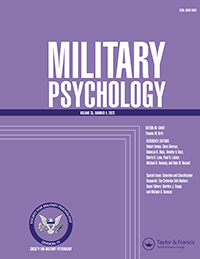HumRRO Principal Scientist Deirdre Knapp, Ph.D., recently co-edited and contributed to the special issue, “Selection and Classification Research: The Criterion Still Matters,” of Military Psychology, the bimonthly journal of Division 19 (Society for Military Psychology) of the American Psychological Association. Knapp brings to the issue her decades of experience conducting testing-related research, as well as designing and managing complex, large-scale validation, selection, and classification efforts for the U.S. Army Research Institute (ARI).
“Criterion identification and measurement is a critical component of the selection and classification process,” wrote Knapp in the issue’s introduction with co-author, Michael G. Rumsey, Ph.D., former chief of the Personnel Assessment Research Unit at ARI. “It ensures that the decisions regarding who should serve and in what capacity are made based on tests demonstrably linked to one or more important organizational objectives. Accordingly, proper criterion identification and measurement supports military effectiveness.”
Despite its focus on the military setting, this special issue of Military Psychology has a great deal of content generalizable to the larger world of work and associated research on talent management.
In support of one of the pillars of HumRRO’s mission as a nonprofit—advancing the science—several other current (as well as former) staff contributed to the special issue:
- “Development of a Performance Taxonomy for Entry-level Military Occupations,” co-authored by former HumRRO staff, Teresa Russell, Matthew Allen, and Laura Ford, as well as government scientists, Thomas Carretta and Cristina Kirkendall, describe development of a taxonomic structure applicable to all early career enlisted personnel across the military services. These contributors also co-authored, “Identification and Evaluation of Criterion Measurement Methods,” which discusses ways to measure criterion constructs that enhances psychometric quality and ease of use. This article should be of particular interest to any industrial-organizational psychologist involved in personnel selection.
- “Defining Occupation-Specific Performance Components for Military Selection and Classification,” discusses goals and methods for generating occupation-specific information. Co-authored by Russell and Michael Ingerick, director of military personnel research at HumRRO, and government scientist Laura Barron, the article provides examples of various approaches to job analysis that have been used in the U.S. military and offers recommendations for conducting informative job analysis studies.
- “Development of Cross-service Training and Job Performance Criterion Measures for the U.S. Military,” by HumRRO senior scientists, Brenda Ellis, Christopher Huber, and Christopher Graves, along with Russell and Ford, provides examples of specific performance criterion measurement strategies. The article focuses on the development of three types of criterion measures for joint-service use: situational judgment tests, performance rating scales, and self-report measures.
- “Designing Criterion Measures for Physically Demanding Jobs,” co-authored by HumRRO principal scientist, Deborah Gebhardt, and senior scientist, Todd Baker, describes job analysis methods well-suited for this performance domain and provides illustrative examples from the U.S. Army, U.S. Air Force, and private industry.
- “Administrative Records-Based Criterion Measures,” co-authored by HumRRO senior scientists, Martin Yu, Matthew Reeder, and vice president David Dorsey, and Allen, provides specific criterion measurement examples drawing from administrative records, offering considerations in using such data sources and recommendations for helping to maximize their quality as criterion measures. The content of this article is applicable to any organizational setting.
The special issue concludes with two commentaries, one focused on policy considerations and the other focused on scientific considerations. The latter commentary is authored by John P. Campbell of the University of Minnesota, who noted “… the six substantive articles in this special issue, which all deal with the assessment of individual performance in some respect, are major contributions to our literature.”
Knapp added, “It was my privilege to help HumRRO’s applied scientists and our client colleagues get their great work into the public eye. It is my sincere hope that this research will inform best practices in selection research in both military and civilian settings.”
Read summaries of all the articles in the special issue of Military Psychology online.









